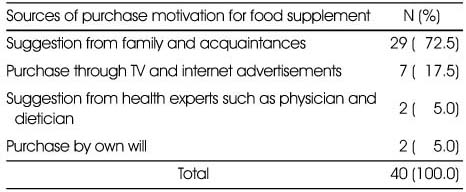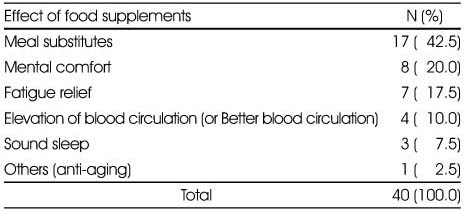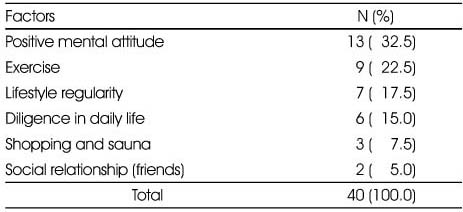Articles
- Page Path
- HOME > Korean J Community Nutr > Volume 16(2); 2011 > Article
-
Original Article
- Climacteric and Menopausal Women's Beliefs on Daily Meals and Food Supplements - A Focus Group Interview Study -
- Jeong-Soon Pyun, Mi Jeong Kim, Kyung-Hea Lee
-
Korean Journal of Community Nutrition 2011;16(2):239-252.
DOI: https://doi.org/10.5720/kjcn.2011.16.2.239
Published online: April 30, 2011
Department of Changwon National University, Changwon, Korea.
1Department of Food and Nutrition, Silla University, Busan, Korea.
- Corresponding author: Kyung-Hea Lee, Department of Food and Nutrition, Changwon University, #9 Sarim-Dong, Changwon 641-773, Korea. Tel: (055) 213-3514, Fax: (055) 281-7480, khl@sarim.changwon.ac.kr
Copyright © 2011 The Korean Society of Community Nutrition
- 980 Views
- 2 Download
- 6 Crossref
Abstract
- The aim of the study was to explore the current status as well as personal views, attitudes, and beliefs regarding daily meal consumption (DM) and food supplement use (FS) in conjunction with the improvement of health condition of the women. Eight focus group interviews were performed and the interview material was condensed systematically with the aim to extract core meanings related to DM, FS, and menopause-associated health. Participants were 40 in number and showed ages ranging from 45 and 60 years with various menopausal status. Current status and beliefs about DM, resources of purchase motivation of FS, types of FS that are currently used, and perceived effects and personal beliefs about FS are discussed. Theme content analysis revealed 3 themes for beliefs about DM, 5 themes for beliefs pertaining FS, and 4 themes for the association between DM and FS. Non-dietary factors such as positive mental attitude and exercise appeared to be also important to maintain good health. The bottom line message from this study may be that proper nutrition through daily meals is essential for good health, while food supplement are used merely to supplement the diet. Findings from this study may deepen our understanding of how women who translate their lifespan through "menopause" perceive the roles and meaning of DM and FS, suggesting health professionals need to monitor and evaluate DM and implement strategies targeting the improvement of daily meal quality of middle and older aged women.
-
This study was supported by the 2009 research fund(09-41) from Management Center for Health Promotion in Republic of Korea.
NOTES
- 1. ADA reports. Position of the American Dietetic Association: Food fortification and dietary supplements. J Am Diet Assoc. 2001; 101(1): 115-125.PubMed
- 2. Baek SS. An analysis of the relationship of menopausal symptoms of midlife women between urban area and rural area. J Korean Acad Womens Health Nurs. 1998; 4(3): 332-347.ArticlePDF
- 3. Baek YA, Kim KN, Lee YA, Chang NS. The effect nutrition education on visceral fat reduction and diet quality in postmenopausal women. Korean J Nutr. 2008; 41(7): 634-644.
- 4. Choi HJ. A study on detailed classification of health functional food market according to lifestyle of female seniors. 2009; Graduate School Daegu University; 22-41 MS thesis.
- 5. Choi HJ, Lee HK, Park HM. The Korean menopausal women's attitudes and awareness on menopause: Results of Korean Gallup Epidemiologic Survey on Menopause and HRT. J Korean Soc Menopause. 2003; 9(1): 36-43.
- 6. Choi HS, Lee JK. A survey of people on awareness of health in urban area. Korean J Food Cult. 1999; 14(3): 203-209.
- 7. Choi MS. Effect of a program for relieving menopausal symptoms. 2001; Graduate School of Korea University; 8-16 Ph.D Degree thesis.
- 8. Choi YJ. The factors associated with bone mineral density in premenopausal and postmenopausal women. 2007; Graduate School of KonKuk University; 7-14 MS thesis.
- 9. Geller SE, Studee L. Botanical and dietary supplements for menopausal symptoms: What works, what does not. J Womens Health (Larchmt). 2005; 14: 634-649.ArticlePubMedPMC
- 10. Gu JO, Park SY. Analysis of BMI, menopause, blood pressure and dietary habits affecting bone mineral density of 30~60 years women. Korean J Community Nutr. 2010; 15(3): 403-414.
- 11. Ham EM. Construction of a menopausal depression model. 2003; Graduate School of Seoul University; 6-33 MS thesis.
- 12. Han SH. A study on the menopausal symptoms, menopausal management and quality of life in middle aged women. 2004; Graduate School of Ewha Womens University; 5-21 MS thesis.
- 13. Harrison RA, Holt D, Pattison DJ, Elton PJ. Are those in need taking dietary supplements? A survey of 21923 adults. British J Nutr. 2004; 91: 617-623.Article
- 14. Inglis V, Ball K, Crawford D. Why do women of low socioeconomic status have poorer dietary behaviours than women of higher socioeconomic status? A qualitative exploration. Appetite. 2005; 45: 334-343.ArticlePubMed
- 15. Foote JA, Murphy SP, Wilkens LR, Hankin JH, Henderson BE, Kolonel LN. Factors associated with dietary supplement use among healthy adults of five ethnicities. The multiethnic Cohort study. Am J Epidemiol. 2003; 157(10): 888-897.ArticlePubMed
- 16. Jeong HJ. Phenomenological study of the spousal caregiving experience for the patients with early dementia - Colaizzi's method of phenomenological interpretation -. 2010; Graduate School of Information in Clinical Nursing of Hanyang University; 12-16 MS thesis.
- 17. Jun BH, Lee HG. An investigation of the intake of the health food among the salary men in Seoul. Korean J Soc Food Sci. 2000; 16(1): 9-16.
- 18. Kathy R, Bernadette B, Jeffery H, Bethene E, Christine S, Mary FP. Dietary supplement use by US adults: Data from the National Health and Nutrition Examination Survey, 1999--2000. Am J Epidemiol. 2004; 160(4): 339-349.ArticlePubMed
- 19. Kim AK. Yangsaeng and health related quality of life (HRQOL) in middle aged women. Korean J Women Health Nurs. 2010; 16(3): 297-306.ArticlePubMed
- 20. Kim AK, Yoo EK. The meaning of menopause experienced by women. J Korean Acad Womens Health Nurs. 1997; 3(1): 67-76.ArticlePDF
- 21. Kim HC, Kim MR. A study on health-functional foods intake pattern of consumers in Busan and Gyeongnam area. Korean J Hum Ecol. 2006; 15(2): 341-352.
- 22. Kim HJ. The study about the actual usage condition and purchasing habitus of health/functional foods in female residents of Seoul and Kyeonggi (The investigation which people who took health/functional foods chose as the research subject. 2008; The Graduate School of Life Environment Yonsei University; 10-35.
- 23. Kim HS, Yoon KH, Lee MJ, Seo BH. Intake and awareness of the functional health food among housewives in Cheongju area. J Hum Ecol. 2005; 9(2): 179-196.
- 24. Kim SH, Han JH, Kim WY. Health functional food use and related variables among the middle-aged in Korea. Korean J Nutr. 2010; 43(3): 294-393.Article
- 25. Knudsen VK, Rasmussen LB, Haraldsdottir J, Ovesen L, Buelow I, Kundsen N, Jorgensen T, Lauberg P, Perrild H. Use of dietary supplements in Denmark is associated with health and former smoking. Public Health Nutr. 2001; 5(3): 463-468.Article
- 26. Koo NS, Park JY. Consumption pattern of health food by adults in Taejon. Korean J Community Nutr. 2000; 5(3): 452-460.
- 27. The statistics of mortality and the causes. Korean National Statistical Office. 2008; cited 2010 September 10. Available from http://www.kostat.go.kr.
- 28. Kun MY. Knowledge of consumption pattern of functional food in middle aged women of Busan. 2008; Graduate School of Education Inje University; 27-55.
- 29. Kwak EK. The middle life women's menopause knowledge, attitude, symptom and management. 2006; Graduate School of KonKuk University; 7-16 MS thesis.
- 30. Lee EJ, Ro SO, Lee CH. A survey on the consumer attitude toward health food in Korea(I): Consumer perception health and food habit. J Korean Soc Diet Cult. 1996; 11(4): 475-485.
- 31. Lee KJ, Chang CJ, Yoo JH. A study on the relationship among climacteric symptoms, knowledge of menopauseand health promoting behavior in middle-aged women. Korean J Women Health Nurs. 2003; 9(4): 400-409.ArticlePDF
- 32. Lim HJ. Association bone mineral density with physiological characteristics and lifestyles in premenopausal working women. J Korean Soc Food Sci Nutr. 2004; 33(2): 339-348.
- 33. Manios Y, Moschonis G, Panagiotakos DB, Farajian P, Trovas G, Lyritis GP. Changes in biochemical indices of bone metabolism in post-menopausal women following a dietary intervention with fortified dairy products. J Hum Nutr Diet. 2009; 22: 156-165.ArticlePubMed
- 34. Ministry for Health, Welfare and Family Affairs. Korea Centers for Disease Control and Prevention. . 2008 Nutrition health statistics - The 4th Korea National Health and Nutrition Examination Survey, the second year (2008). 2009; Korea Centers for Disease Control and Prevention.
- 35. Park BH, Lee YS. The relationship between the stress and climacteric symptoms of middle-aged women. J Korean Acad Womens Health Nurs. 2000; 6(3): 383-397.ArticlePDF
- 36. Park HS, Lee YM, Cho GY. A study on climacteric symptoms, knowledge of menopause, menopausal managementin middle-aged women. Korean J Women Health Nurs. 2002; 8(4): 521-528.ArticlePDF
- 37. Park JY. Aspects of dietary behavior and consumption pattern of health food by adults in Taejon. 2000; Taejon University; 38-59 MS thesis.
- 38. Park NH. A study on the adult women intakes of healthy functional foods in Gang-Won. 2008; Graduate School of Education Chungnam National University; 26-45 MS thesis.
- 39. Park SM, Kim HK. Experience of cervical cancer screening among menopausal women. Korean J Women Health Nurs. 2003; 9(1): 28-38.ArticlePDF
- 40. Park SY. Participatory action research for promoting the menopausal women's health: Focusing on the participant's in "women's health Da-Ji-Ki" in community public healthcare center. 2004; Graduate School of Ewha Womens University; 15-39 MS thesis.
- 41. Pakzad K, Boucher BA, Kreiger N, Cotterchio M. The use of herbal and other non-vitamin, non-mineral supplements among pre- and post-menopausal women in Ontario. Can J Public Health. 2007; 98(5): 383-388.ArticlePubMedPMCPDF
- 42. Kirk SF, Cade JE, Barrett JH, Conner M. Diet and lifestyle characteristics associated with dietary supplement use in women. Public Health Nutr. 1999; 2(1): 69-73.ArticlePubMed
- 43. Seo MS. Woman's health problem in Ministry of Genderequality & Family. Korean J Health Promot Dis Prev. 2002; 2(1): 115-118.
- 44. Sung CJ, Baek SK, Lee HS, Kim MH, Choi SH, Lee SY, Lee DH. A study of body anthropometry and dietary factors affecting bone mineral density in Korean pre-, and postmenopausal women. J Korean Soc Food Sci Nutr. 2001; 30(1): 159-167.
- 45. Low Dog T. Menopause: a review of botanical dietary supplements. Am J Med. 2005; 118: Suppl 12B. 98-108.ArticlePubMed
- 46. Yang JH. A study on health behavior experience of middleaged women in rural area. J Korean Acad Nurs. 2002; 32(5): 694-705.ArticlePDF
- 47. You SY, Kim HK. Food habits and health food consumption patterns of adults in the Ulsan area. Korean J Community Nutr. 2003; 8(6): 889-900.
- 48. Yoo YJ, Hong WS, Youn SJ, Choi YS. The experience of health food usage for adults in Seoul. Korean J Soc Food Cookery Sci. 2002; 18(2): 136-146.
REFERENCES
Figure & Data
REFERENCES
Citations

- Evaluation of Anthropometric Characteristics, Bone Density, Food Intake Frequency, Nutrient Intakes, and Diet Quality of Preand Postmenopausal Women : Based on 2008∼2011 Korean National Health and Nutrition Examination Survey
Soon Nam Choi, Kwang Hyun Jho, Nam Yong Chung
Journal of the East Asian Society of Dietary Life.2017; 27(5): 500. CrossRef - Acculturation, Food Intake and Dietary Behaviors of Chinese College Students in Busan by Residential Period
Fangfang Song, Mi Jeong Kim
Journal of the East Asian Society of Dietary Life.2015; 25(4): 594. CrossRef - Foodservice Satisfaction of Patients over 60 according to the Type of Foodservice Operation: The Case of B Hospital
Shin Hey Lee, Jung Hwa Choi
The Korean Journal of Community Living Science.2015; 26(4): 683. CrossRef - Dietary Habits and Climacteric Symptoms according to the Level of Food Supplement Use of Middle-aged Women
Mi Jeong Kim, Kyung-Hea Lee
Journal of the Korean Society of Food Science and Nutrition.2013; 42(7): 1054. CrossRef - Development of Food Safety and Nutrition Education Contents for the Elderly - by Focus Group Interview and Delphi Technique -
Jung-Hwa Choi, Eun-Sil Lee, Yoon-Jin Lee, Hye-Sang Lee, Hye-Ja Chang, Kyung-Eun Lee, Na-Young Yi, Yun Ahn, Tong-Kyung Kwak
Korean Journal of Community Nutrition.2012; 17(2): 167. CrossRef - The Related Factors Influencing on Self-rated Health Level of Middle-aged Women
Hyejin Lee, Kyung-Hea Lee, Eunkyung Kim, Mi-Jung Kim, Suk-Man Hwang
Korean Journal of Community Nutrition.2012; 17(3): 290. CrossRef
Recruitment of participants for 8 focus group interviews
1) Artificial: artificial menopause
General characteristics of subjects
1) Artificial: artificial menopause, Values are frequencies (%) and *Mean ± SD
Characteristics of daily meals described by subjects
Beliefs about daily meals
Major sources of purchase motivation for food supplements
Current status of food supplement use
Reasons for food supplements use
Beliefs about food supplements use
Other factors except for meals that affect daily health condition
Beliefs about the associations between daily meals and food supplements consumption in view of health improvement
1) Artificial: artificial menopause
1) Artificial: artificial menopause, Values are frequencies (%) and *Mean ± SD

 KSCN
KSCN










 Cite
Cite


